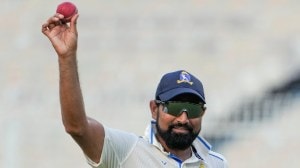Sinha to proceed cautiously on full float of rupee
WASHINGTON, APRIL 18: India will not be pressured by multilateral funding agencies into setting a tight time-frame for switching to capital ...

WASHINGTON, APRIL 18: India will not be pressured by multilateral funding agencies into setting a tight time-frame for switching to capital account convertibility CAC but will work hard towards fulfilling the pre-conditions for achieving full-float of the rupee.
8220;On CAC, I don8217;t have a time frame yet. We will continue to work very hard to achieve the pre-conditions before we go ahead with full float of the rupee,quot; Finance Minister Yashwant Sinha told reporters here before leaving for London early today.
He, however, made it clear that there can not be uniform models proposed by IMF-World Bank and in each sector the international prescription has to be adapted to suit India8217;s requirement.
Citing the Tarapore committee report on CAC, he said the group set up by the Reserve Bank RBI had enumerated several pre-conditions before ushering in CAC, one of which pertained to limiting fiscal deficit to 3 per cent of the gross domestic product GDP.
quot;Quite clearly, therefore, when the fiscal deficit hasreached as high as six per cent of GDP, it is not the time for capital account convertibility,quot; Sinha said.
Referring to his discussions with IMF-World Bank teams, the Finance Minister said India made the point that each country must be encouraged to find solutions of its own in the light of its experiences and that there should be no forcing of solutions by multilateral agencies.
He asserted that his first budget, to be presented to Parliament next month, would aim to reduce fiscal deficit, increase public spending while keeping inflation in check.
quot;The mystery will be out when I present the budget. I know I am talking about reconciling what may apparently appear irreconcilable8230;.But, wait for the budget and see how this can be done,quot; Sinha said.
On his deliberations at the IMF8217;s interim committee and the joint fund-bank development committee, he said it would be better for India to proceed surely even if it means proceeding slowly. quot;The lesson of the east Asia crisis is that one formula cannot beapplied to all countries.quot;
He expressed satisfaction over the response from global investors as also with the content of the communiques issued by the interim and development committees, which were in keeping with the Indian position.
The finance minister said he also attempted to dispel the view among American media that BJP was a quot;Hindu nationalistquot; party and insisted that it was more secular than most other political formations in India. On the IMF8217;s proposed amendment to include CAC as one of its goals, Sinha said developing countries pointed out that if growth was not accompanied by social justice, it would create problems.
The market and private funds will take care of growth, but it is essential for government to continue to play a role in order to ensure social justice, he said.
Over the last few years, governments had drastically cut public spending on infrastructure sector under the assumption that its development infrastructure would be taken care of by private sector, the Finance Ministersaid.
While private investment growth was stymied by cumbersome procedures, electoral compulsions forced government in 1996 to follow a tight monetary policy, which curtailed the momentum of the economy but succeeded in reining in inflation. quot;One of the things we must do is to increase expenditure in infrastructure sector, which then would automatically make the public sector expand while also encouraging the private sector to park funds in the core sector,quot; he said.
Asked whether his government was committed to bring the rupee-dollar rate back to Rs 17, Sinha said the only important issue in Forex management was maintaining orderly conditions and avoiding volatility and turbulence.
- 01
- 02
- 03
- 04
- 05






























